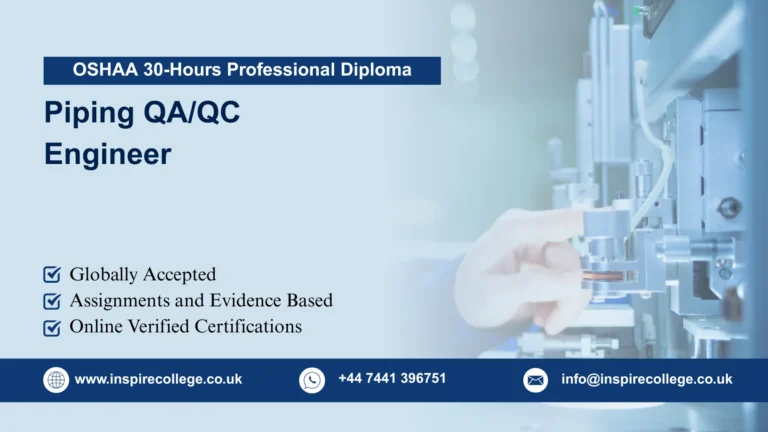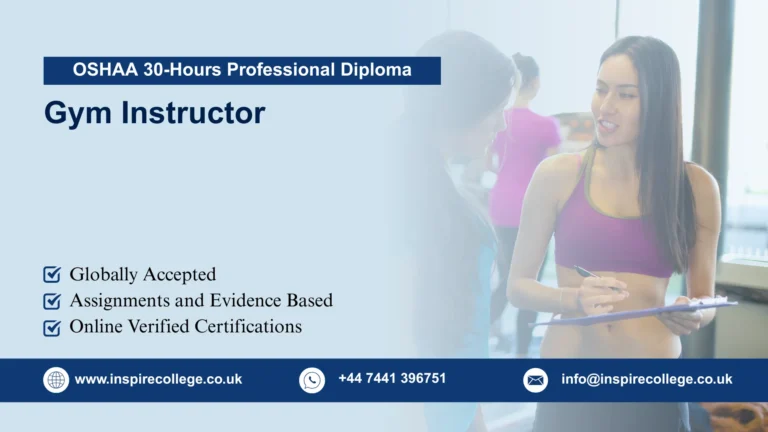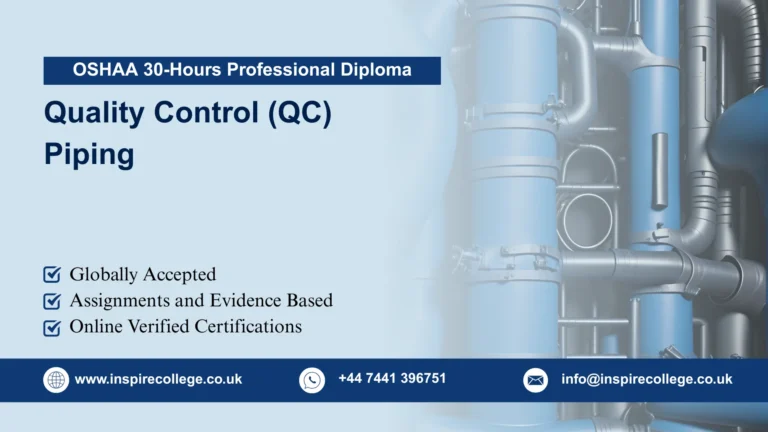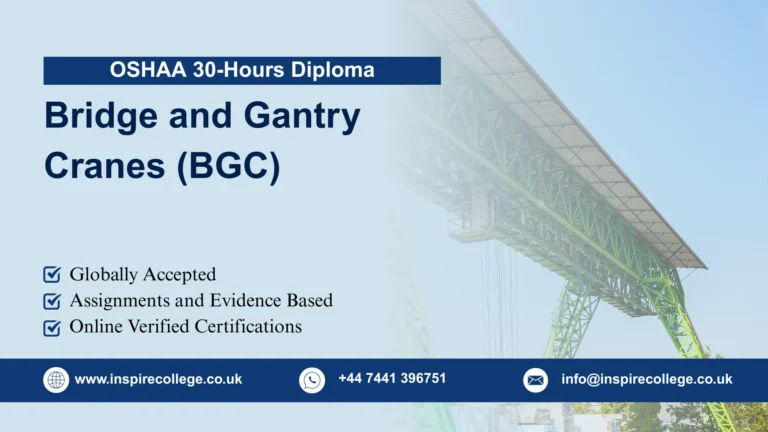
OSHAA 30-Hours Professional Diploma in QA/QC Piping Inspector
In industrial and construction sectors, the quality, safety, and integrity of piping systems are critical for operational efficiency, regulatory compliance, and risk management. The OSHAA 30-Hours Professional Diploma in QA/QC Piping Inspector is designed to provide professionals with the technical expertise, practical inspection skills, and industry-standard knowledge required to ensure the highest levels of quality in piping projects.
OSHAA 30-Hours Professional Diploma in QA/QC Piping Inspector covers essential topics including welding procedures, piping materials and components, fabrication practices, defect identification, non-destructive testing (NDT), interpretation of piping drawings, and adherence to international codes and standards such as ASME, API, and ISO. Participants will gain hands-on experience in evaluating piping and welding quality, conducting inspections, identifying non-conformities, and implementing corrective actions effectively. Emphasis is placed on real-world applications to prepare learners for the practical challenges faced in industrial environments.
By completing OSHAA 30-Hours Professional Diploma in QA/QC Piping Inspector, participants will develop the ability to execute inspection and test plans (ITPs), maintain accurate documentation such as Welding Procedure Specifications (WPS), Procedure Qualification Records (PQR), and NDT reports, and ensure compliance with global quality and safety standards. Graduates will be equipped to contribute effectively to high-quality, safe, and reliable piping projects across industries including oil and gas, petrochemical, power generation, manufacturing, and construction.
The OSHAA 30-Hours Professional Diploma in QA/QC Piping Inspector is ideal for QA/QC engineers, welding inspectors, site supervisors, project engineers, and other professionals seeking to enhance their technical competence, practical skills, and career prospects in industrial piping inspection and quality assurance.
To successfully enroll and benefit from the OSHAA 30-Hours Professional Diploma in QA/QC Piping Inspector, applicants should meet the following criteria:
- Age Requirement
- Must be at least 18 years old to ensure participants have the maturity needed for professional-level industrial training.
- Supports readiness for responsibilities related to safety, inspections, and compliance in industrial environments.
- Educational Requirements
- Minimum requirement: high school diploma or equivalent.
- Preferred: candidates with formal education in mechanical engineering, welding technology, metallurgy, piping engineering, or related technical fields.
- Candidates with additional certifications in QA/QC, welding, or industrial inspection are highly encouraged.
- Professional Experience
- Prior experience in QA/QC, welding, piping fabrication, construction, or industrial inspection is advantageous.
- Ideal for QA/QC engineers, piping inspectors, project engineers, site supervisors, and construction managers seeking advanced technical skills.
- Professionals with experience in oil and gas, petrochemical, power generation, or manufacturing sectors are particularly well-suited.
- Technical Skills
- Basic understanding of piping systems, welding processes, and fabrication techniques.
- Ability to read and interpret engineering drawings, piping isometrics, and layout diagrams.
- Familiarity with quality documentation such as Welding Procedure Specifications (WPS), Procedure Qualification Records (PQR), and Non-Destructive Testing (NDT) reports.
- Awareness of industrial safety standards and inspection procedures is preferred.
- Motivation and Commitment
- Demonstrated interest in QA/QC practices, welding inspection, and industrial quality assurance.
- Strong commitment to completing 30 hours of structured learning, including both theoretical instruction and practical exercises.
- Willingness to apply learned skills to real-world industrial projects and ensure compliance with safety and quality standards.
- English Language Proficiency
- Competence in reading, writing, and communicating in English is required to understand technical manuals, international codes, and inspection documentation.
- Supports effective communication in industrial and international work environments.
- Related Course Recommendation
- OSHAA 30-Hours Professional Diploma in QA/QC Piping and Welding Engineering: This course builds on inspection knowledge by providing in-depth training in QA/QC practices, welding technologies, defect detection, and advanced industrial inspection techniques.
Mandatory Units
The OSHAA 30-Hours Professional Diploma in QA/QC Piping Inspector, to achieve the qualification candidates must complete all the mandatory units form the following :
Mandatory Units
- Introduction to QA/QC in Piping Projects
- Piping Materials, Components, and Fabrication Practices
- International Standards and Codes: ASME, API, ISO
- Welding Fundamentals and Visual Inspection
- Non-Destructive Testing (NDT) Methods and Applications
- Reading and Interpretation of Piping Isometrics and Layout Drawings
- Inspection and Test Plans (ITPs) and Quality Control Procedures
- Fabrication and Erection Inspection Techniques
The OSHAA 30-Hours Professional Diploma in QA/QC Piping Inspector is designed to equip learners with the technical knowledge, practical skills, and professional competence required to perform high-quality inspections, ensure compliance with international standards, and maintain safety and reliability in industrial piping projects. Participants will gain hands-on experience in evaluating piping systems, identifying defects, interpreting engineering documentation, and implementing quality control procedures effectively.
1. Introduction to QA/QC in Piping Projects
- Understand the principles and objectives of Quality Assurance (QA) and Quality Control (QC) in piping projects.
- Recognize the roles and responsibilities of QA/QC inspectors, engineers, and supervisors.
- Comprehend the importance of QA/QC in ensuring project safety, compliance, and operational efficiency.
- Apply QA/QC principles to real-world piping inspection scenarios.
2. Piping Materials, Components, and Fabrication Practices
- Identify common piping materials, components, and their industrial applications.
- Understand fabrication and assembly practices, including welding and joint preparation.
- Evaluate material suitability and quality during fabrication and installation.
- Ensure compliance of piping components with project specifications and standards.
3. International Standards and Codes: ASME, API, ISO
- Interpret key international standards relevant to piping and welding inspection.
- Apply ASME, API, and ISO codes in QA/QC procedures and inspections.
- Ensure compliance with regulatory requirements and industry best practices.
- Integrate code knowledge into practical inspection and reporting activities.
4. Welding Fundamentals and Visual Inspection
- Understand welding processes, techniques, and equipment used in piping fabrication.
- Perform visual inspections to identify common welding defects such as cracks, porosity, and undercuts.
- Assess weld quality against international standards and project specifications.
- Implement corrective actions for detected non-conformities.
5. Non-Destructive Testing (NDT) Methods and Applications
- Gain knowledge of NDT methods including ultrasonic, radiographic, magnetic particle, and dye penetrant testing.
- Apply NDT techniques to detect defects in piping and welding systems.
- Interpret NDT results to ensure compliance with quality standards.
- Follow safety procedures and best practices during on-site NDT inspections.
6. Reading and Interpretation of Piping Isometrics and Layout Drawings
- Accurately read and interpret piping isometrics, layout diagrams, and engineering schematics.
- Understand symbols, dimensions, and annotations used in piping drawings.
- Apply drawing interpretation skills to plan inspections and verify installation compliance.
- Ensure materials, fabrication, and assembly conform to design specifications.
7. Inspection and Test Plans (ITPs) and Quality Control Procedures
- Develop and implement Inspection and Test Plans (ITPs) for piping projects.
- Apply QA/QC procedures at various stages of fabrication and installation.
- Monitor project progress and conduct inspections at critical points.
- Document findings and coordinate with project teams to resolve non-conformities.
8. Fabrication and Erection Inspection Techniques
- Conduct on-site inspections during fabrication and erection of piping systems.
- Identify and evaluate defects or deviations from project requirements.
- Recommend corrective and preventive measures to maintain system integrity.
- Ensure adherence to safety, quality, and regulatory standards throughout project execution.
The OSHAA 30-Hours Professional Diploma in QA/QC Piping Inspector is designed for professionals seeking to strengthen their technical expertise, practical inspection skills, and industry knowledge in piping and welding quality assurance. This program is suitable for learners who want to ensure high-quality, safe, and compliant piping projects while advancing their career in QA/QC and related engineering disciplines.
The ideal learner includes:
- QA/QC engineers responsible for overseeing quality assurance and control in piping and welding projects.
- Piping and welding inspectors conducting on-site fabrication, installation, and quality inspections.
- Project engineers, site supervisors, and construction managers ensuring compliance with QA/QC standards and procedures.
- Professionals working in critical industries such as oil and gas, petrochemicals, power generation, construction, and manufacturing.
- Graduates and professionals from mechanical engineering, metallurgy, welding technology, or related technical fields seeking specialized QA/QC knowledge.
- Individuals aiming to gain hands-on skills in inspection and test plans (ITPs), non-destructive testing (NDT), defect identification, and welding quality assessment.
- Professionals interested in understanding and applying international codes and standards such as ASME, API, and ISO.
- Individuals committed to Continuing Professional Development (CPD) and career growth in industrial QA/QC, piping inspection, and welding inspection.
- Learners seeking practical experience in interpreting engineering drawings, maintaining QA/QC documentation, and implementing corrective measures.
- Professionals dedicated to enhancing operational safety, ensuring project reliability, and maintaining compliance with industry regulations.
By completing this diploma, learners will gain the technical competence, confidence, and practical knowledge needed to perform inspections, manage QA/QC documentation, and contribute effectively to high-quality, safe, and reliable piping projects across global industrial environments.
Register Now
OSHAA 30-Hours Professional Diploma in QA/QC Piping Inspector






